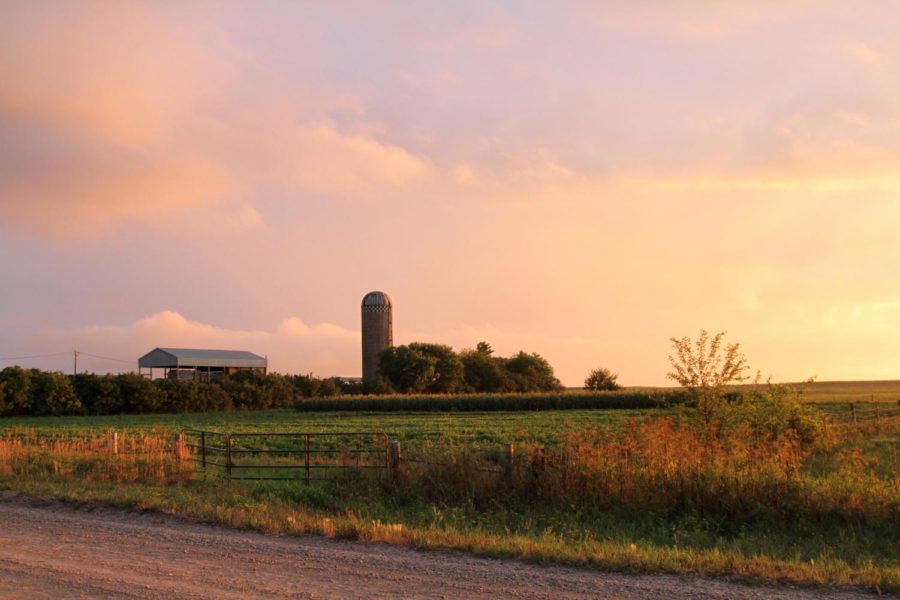Stowers: How do Iowa’s newly elected officials view environmental policy?
Field across from the Sheep Teaching Farm on July 27, 2017.
November 13, 2018
We all just voted on Nov. 6 (or before that), and we watched the historic results come in to give us our newest governor and state representatives. Now that they’re newly in office or returning to office, what are their plans for the environment, one of the biggest issues we face? Let’s take a look.
Kim Reynolds, Iowa Governor
Governor Kim Reynolds is proud of the accomplishments Iowa has made in renewable energy, many of which have occurred in her terms as Lieutenant Governor. In 2016, over one-third of Iowa’s energy came from wind, with what Reynolds calls “the most reliable electric grid in the country.”
Solar energy is also a hit in Iowa: Gov. Reynolds says that almost all 99 counties have some sort of solar power installed, especially on the tops of farmers’ barns. Despite Iowa rocking renewable energy, there are some environmental shortcomings in the Terry Branstad and now Reynolds administrations. The biggest one is water quality. Nitrogen and soil runoff from Iowa’s farms pollutes our rivers, and eventually the ocean.
According to National Geographic, there are fairly simple solutions, but they aren’t always immediately profitable for farmers. For example, cover crops could aid in preventing soil from escaping fields, but cover crops were planted on less than 3 percent on Iowa’s cropland in 2016.
Perhaps incentivizing farmers to perform sustainable land practices would work for improving water quality, but the Aldo Leopold Center for Sustainable Agriculture, which researches sustainable land practices in Iowa, was completely cut in 2017 under Governor Branstad.
That leads into some additional budgeting challenges, with the budget for environmental health positions being cut in half between 2009 and 2017. Governor Reynolds and Iowa have a lot of potential to lead on the environment, but there is a lot of work to do.
Mike Naig, Iowa Secretary of Agriculture
Mike Naig was the deputy agriculture secretary, who was promoted to secretary after his predecessor, Bill Northey, moved on to the USDA. Secretary Naig wants to continue soil and water quality initiatives that are currently going on in the state.
Regarding climate change, Naig feels he’s not qualified to weigh in on the human impact, saying “Certainly human beings have an impact on our environment, but to say that’s the entire driver of climate change, I can’t say that.”
Abby Finkenauer, Representative-Elect for IA-01
Like Reynolds, Abby Finkenauer is proud of Iowa’s commitment and leadership for renewable energy. On her campaign website, she states that she is frustrated that corporations take advantage of loopholes to continue to pollute the environment for a quick buck.
Finkenauer plans to use her time in Congress to advocate for farmers in the face of climate change, and to continue to be a watchdog for sustainable initiatives. Previously, she served as a watchdog for Iowa Energy Center at Iowa State against fossil fuel industry lobbyists.
Dave Loebsack, Representative for IA-02
Congressman Dave Loebsack was re-elected for another term and he has been serving Iowa’s environmental interests on the House Energy and Commerce Committee. He is also the co-chair of the Renewable Energy and Energy Efficiency Caucus.
Loebsack wants to invest in renewable energy to grow the economy. In the past, he has fought to protect the Wind Production and Solar Investment tax credits and he wants to end American reliance on fossil fuels.
Regarding climate change, Loebsack says, “I have long believed that the science is settled, climate change is happening.”
Cindy Axne, Representative-Elect for IA-03
Working for the state of Iowa, Cindy Axne oversaw the governor’s Agenda on Clean Energy and the Environment, aiding Iowa’s wind industry. Axne wants to increase research and development of “soil health, carbon sequestration, and water quality.”
She says that climate change is putting farmers’ livelihoods at stake, with more extreme and unpredictable weather patterns. In Congress, she plans to promote investment in more efficient cars, appliances, and buildings.
Steve King, Representative for IA-04
Steve King has represented Northwest Iowa for several terms in Congress. He is a member of the House Agriculture Committee. Congressman King has recently encouraged President Trump to adopt pro-ethanol policies, opening the way for Iowan biofuels.
An advocate for American energy independence, King promotes wind energy and biofuels, but his “all of the above” energy policy also includes American fossil fuels and coal. Another one of King’s challenges toward the environment was his “yes” vote for deauthorizing critical habitat for endangered species.
No matter whether you root for team “red” or team “blue,” environmental policy affects all of us. As the makeup of our government changes, pay attention to how they act and what they promise us in regards to our future.
As much as personal actions help, such as shopping with reusable bags or refusing straws, our lawmakers and the legislation they create have an enormous impact on the future of our country and our planet. Don’t be afraid to reach out to them and make your opinion heard — it’s not crazy to care about our future.
















